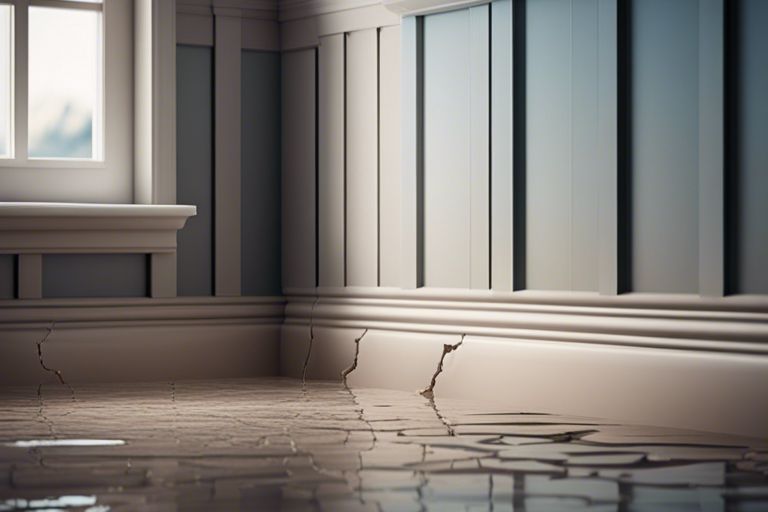Could Cracks In Your Walls Or Floors Be Due To Slab Leaks?

Just noticed cracks appearing in your walls or floors at home? While it may be tempting to ignore them, these cracks could be a sign of a more serious issue – slab leaks. Slab leaks occur when pipes beneath your home’s foundation start leaking, causing water to seep into the ground and compromise the integrity of your foundation. If left unchecked, slab leaks can lead to significant structural damage and even mold growth. In this blog post, we’ll explore how slab leaks can cause cracks in your walls or floors, the warning signs to look out for, and what steps you can take to address this issue before it escalates. Key Takeaways: Slab leaks can cause cracks in walls or floors: When there is a leak in the water lines beneath your home’s foundation, the moisture can weaken the concrete slab, leading to cracks in your walls or floors. Monitor your water bill for unexplained increases: If you notice a sudden spike in your water bill without a corresponding increase in usage, it could be a sign of a slab leak that is causing hidden damage to your home. Seek professional help to detect and repair slab leaks: It is crucial to contact a professional plumber with experience in slab leak detection to accurately pinpoint the source of the leak and provide solutions to prevent further damage to your property. Understanding Slab Leaks Any Can A Slab Leak Cause Foundation Problems? Yes. What Is a Slab Leak? On the surface, a slab leak may seem like a minor issue, but it can actually lead to significant damage if not addressed promptly. A slab leak refers to a water leak that occurs beneath the concrete slab foundation of a building. This type of leak can go unnoticed for a long time, causing water to seep into the foundation and compromise its structural integrity. Common Causes of Slab Leaks Understanding the common causes of slab leaks is crucial for homeowners to prevent potential foundation problems. Leaks can be caused by factors such as poor installation, corrosion of pipes, shifting soil, or high water pressure. Ignoring these issues can lead to extensive water damage, mold growth, and even foundation failure. It’s important to address any signs of a slab leak promptly to avoid costly repairs and structural damage to your home. Identifying Slab Leak Indicators Cracks in Walls and Floors The presence of cracks in the walls or floors of your home can be a clear indicator of a possible slab leak. Slab leaks can cause shifts in the foundation, leading to visible cracks. These cracks may start small but can quickly widen over time, indicating a serious issue that needs immediate attention. Other Key Signs of Slab Leaks On top of cracks, there are several other key signs of slab leaks to watch out for. Pay attention to unexplained increases in your water bill, damp or hot spots on your floors, the sound of running water when all fixtures are turned off, and mold or mildew growth. Ignoring these signs can lead to costly damage and potential health risks. Understanding the indicators of slab leaks is crucial for homeowners to catch issues early and prevent further damage. By being vigilant and addressing any warning signs promptly, you can save yourself from extensive repairs and protect the structural integrity of your home. Addressing Slab Leaks Initial Steps and Inspection Keep a close eye on any signs of potential slab leaks, such as cracks in your walls or floors, a sudden increase in your water bill, or the sound of running water when no taps are open. If you suspect a slab leak, the first step is to conduct a thorough inspection of your property to locate the source of the leak. Professional Repair Options Any professional repair options for slab leaks should begin with a detailed inspection by a licensed plumber specializing in slab leak detection and repair. Slab leaks can cause extensive damage to your property if left untreated, compromising the structural integrity of your home and leading to costly repairs. A professional plumber will use advanced techniques such as electronic leak detection and thermal imaging to pinpoint the exact location of the leak. Prevention and Maintenance Preventative Measures Your home is your sanctuary, and it is crucial to protect it from potential damage caused by slab leaks. An effective way to prevent slabs leaks is by ensuring proper installation and maintenance of your plumbing system. Make sure to hire a qualified plumber to inspect your pipes regularly and fix any issues promptly to avoid costly repairs in the future. Routine Check-Up Tips Measures Regularly inspect your walls and floors for any signs of cracks or water damage. Keep an eye out for wet spots or mold growth as they could be indicators of a slab leak. Monitor your water bill for any sudden increases which could signal a leak. After conducting these routine checks, it is necessary to contact a professional plumber to assess the situation and perform any necessary repairs. With slab leaks, early detection is key to preventing extensive damage to your property. By staying vigilant and following these preventative measures and routine check-up tips, you can safeguard your home from the potential dangers of slab leaks. Final Words So, if you notice cracks appearing in your walls or floors, don’t ignore them as mere aesthetic issues. These could be signs of a more serious problem like slab leaks. Taking prompt action by getting a professional inspection can help prevent potential water damage and structural issues in your home. Recall, addressing slab leaks early can save you time, money, and headaches in the long run. Don’t wait until it’s too late, be proactive in protecting your home. FAQ Q: What are slab leaks? A: Slab leaks are water leaks that occur in the water lines beneath the concrete slab foundation of a building. Q: How can slab leaks cause cracks in walls or floors? A: When there
